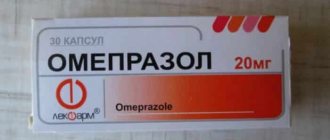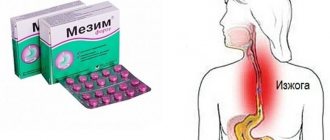Everyone has encountered digestive problems sooner or later. Most often we are talking about episodic discomfort, in particular heartburn.
Heartburn is a burning sensation in the stomach area that usually appears after eating. Most often, this is an episodic symptom that is quite easy to stop, however, it also happens that heartburn bothers a person regularly. In this case, consulting a doctor is simply necessary.
As a rule, one of the first drugs that a gastroenterologist prescribes after diagnosing a disease associated with damage to the gastric mucosa (gastritis, ulcers, etc.) is Omeprazole. How effective is this drug for heartburn? First things first.
Release form. Compound
Omeprazole is produced by Russian drug manufacturers:
- Ozone is a pharmaceutical company with eighteen years of experience.
- JSC "Sintez"
- JSC "AVVA RUS".
- CJSC "Canonpharma Production"
Drugs with similar effects and varying dosages are also produced abroad.
On the pharmaceutical market, this medical drug is presented in the form of hard enteric capsules of 20 mg with granules inside. This drug does not come in tablet form. But powder for preparing a solution for injection is found.
One blister pack contains from seven to ten pieces of medicine. A pack of a medicinal product may consist of several blister packs. Therefore, the patient can freely choose the right amount of medication for complete treatment.
The main element of the chemical composition of the remedy is omeprazole. Among the auxiliary elements are the following:
- Food coloring E 171.
- Sodium salt of lauryl sulfuric acid.
- Collagen.
- Methylparaben.
- Disaccharide.
- Glycerol.
- Distilled water.
- Calcium carbonate.
Form of release of the drug and its effect on heartburn
Omeprazole is a time-tested drug widely used by gastroenterologists in the treatment of gastrointestinal diseases accompanied by increased secretion of gastric juice. In Russia, its manufacturers are the pharmaceutical companies Canonpharma Production, Ozon, AVVA-RUS and Sintez. The medicine is available in the form of hard, opaque capsules, the color of which may vary depending on the manufacturer. Inside the capsules there are spherical pellets (granules) of white or beige color. Capsules are packaged in blister packs of 10 pieces. Inside the cardboard box there are 2 or 3 blisters and instructions from the manufacturer.
The active ingredient of the drug is omeprazole, the dosage of which in each capsule is 20 mg. The list of auxiliary components of the drug includes gelatin, glycerol, sodium lauryl sulfate, nipazole, nipagin, titanium dioxide and water.
Heartburn is a concomitant symptom of diseases of the digestive system that develop as a result of increased production of gastric juice. The use of omeprazole can reduce daytime and nighttime secretion of gastric juice and thereby eliminate the main cause of heartburn. The clinical effect of the drug is observed when taken once a day. The maximum effect of the active component occurs 4 days after the start of therapy. Omeprazole not only helps against heartburn, but also helps eliminate belching, nausea, reduces the intensity of pain in the stomach, accelerates the healing of the mucous membrane of the digestive tract affected by the inflammatory process, and prevents the development of peptic ulcers.
Pharmacological action (How does omeprazole work for heartburn)
This medication is an antisecretory agent.
It works not with the consequence, but with the cause of the disease. In medical practice, it is actively used to treat erosions and stomach ulcers of various origins. Omeprazole is a proton pump blocker.
This medication balances the acid levels in the stomach. Relieves inflammation of the pancreas. Relieves the acute phase of pathological manifestations.
An hour after taking the medicine, the patient may feel relief from pain. The relief will last twenty-four hours. A person will feel a positive result from treatment therapy in three to four days. After finishing taking the medication, the effect of treatment may last for a couple of days.
This medication is characterized by enveloping and antibacterial properties. Promotes rapid healing of wounds on the mucous membrane of the human digestive system. It also eliminates nausea, sour belching, bloating and spasms in the digestive tract.
This medicine should not be taken if the level of hydrochloric acid in the stomach is low.
pharmachologic effect
The medication is classified as an antisecretor, which is very often used in medicine to treat ulcers, erosions, and various types of inflammation of the upper organs of the gastrointestinal tract.
Heartburn can be a constant symptom of pathologies that develop due to increased production of gastric juice, mostly consisting of hydrochloric acid. When the amount of acid increases, it can be released into the esophagus, causing burning, bitterness and other discomfort.
To reduce the release of gastric contents into the esophagus, proton pump inhibitors are used. Omeprazole, produced in the form of capsules, belongs to such drugs. The drug, dissolving, penetrates the cellular structure of the stomach, inhibiting its secretory function. In simple words, the drug reduces the production of hydrochloric acid and that is why it is good for heartburn. In this case, the active ingredients of Omeprazole become active only in the acidic environment of the digestive tract.
On a note! With low acidity, medications in this group are absolutely useless and can even be harmful.
Among other things, the medication has bactericidal properties and is effective against Helicobacter pylori bacteria, which cause gastrointestinal diseases. The substance envelops the stomach, providing a healing effect for erosive lesions of the mucous membrane. Thus, gastroenterologists, with the help of Omeprazole, manage to cure not only heartburn itself, but also its causes. After all, diseases such as gastritis and stomach ulcers are very often accompanied by the release of acidic contents into the esophagus.
The medicine, unlike antacids, does not mask the symptoms, but acts directly at the root of the problem.
In addition to the main effect, Omeprazole for heartburn also eliminates other symptoms associated with gastrointestinal diseases - belching, nausea, intestinal cramps, bloating, stomach pain.
The capsules begin to act on the first day after administration. The maximum therapeutic effect is not achieved immediately, but only on the 3-4th day of taking the medication.
Products of drug metabolism are eliminated to a greater extent by the kidneys.
Omeprazole is an effective remedy for heartburn
Indications
Gastroenterologists prescribe this drug to relieve unpleasant episodic symptoms. Omeprazole is often prescribed for the treatment of the following digestive diseases:
- Peptic ulcer of bacterial origin.
- Zollinger-Ellison syndrome.
- Heartburn.
- Pancreatitis.
- Gastritis with increased levels of hydrochloric acid.
- Erosive esophagitis.
- Multiple endocrine adenomatosis.
- Gastroesophageal reflux.
- Digestive disorders due to the use of non-steroidal anti-inflammatory drugs.
- Prevention of recurrence of peptic ulcer.
We recommend: Rennie for heartburn
The listed indications are contained in the description of the drug and require careful study.
When treating adults and children
The dosage of a drug such as Omeprazole is always calculated by the attending physician depending on what disease the patient has and how severe it is. The age of the patient and what diseases, besides heartburn, he suffers from also matter.
If for any reason it is not possible to visit a gastroenterologist, adults can take Omeprazole on their own according to the following regimen:
- reflux esophagitis and peptic ulcer – 1 capsule (20 milligrams) per day (for acute form of reflux esophagitis – 2 capsules per day), course of treatment – from two to five weeks (in some cases – two months);
- if the patient’s sensitivity to Omeprazole is low, the dosage is doubled - to 2 capsules (40 milligrams) per day, while the course of treatment is also extended to one and a half to two months;
- peptic ulcer accompanied by liver failure - from 1/2 to 1 capsule (10-20 milligrams) per day (no more!), exceeding the dosage can create additional health problems;
- Zollinger-Ellison syndrome – 3 capsules (60 milligrams) at a time, in acute form – 4-6 capsules (from 80 to 120 milligrams);
- gastritis with high acidity – 1/2 capsule (10 milligrams) per day;
- Helicobacter pylori bacteria – 1 capsule (20 milligrams) twice a day.
Omeprazole is usually not prescribed for children, but in some cases (for example, with Zollinger-Ellison syndrome) this drug cannot be avoided. Since young patients often cannot swallow the medicine whole, the capsule is opened for them and the required amount of the drug is dissolved in a small amount of liquid.
The dosage for children is calculated not only depending on age, but also on weight:
- babies weighing less than 10 kilograms are given 5 milligrams of the drug;
- children who weigh 10-20 kilograms – 10 milligrams;
- over 20 kilograms – 15-20 milligrams.
Giving your child Omeprazole on your own is strictly prohibited! Treatment must be carried out under the supervision of a doctor!
Contraindications
A distinctive property of Omeprazole is that it is well tolerated by people with different medical histories and the absence of severe consequences.
To avoid unpleasant results from taking any medication, we advise you to familiarize yourself with the contraindications.
Among them are:
- Hypersensitivity to the active element of the drug.
- Kidney dysfunction.
- Chronic liver diseases (including history).
- Childhood. In case of urgent need, taking the drug is agreed with the attending physician.
- Malignant neoplasms.
- Osteoporosis.
- Gastritis with low levels of hydrochloric acid.
If the dose of the drug is not increased in consultation with the doctor, the following symptoms of overdose may occur:
- Prostration.
- Insomnia.
- Increased body temperature.
- Cardiopalmus.
- Weakening of visual function.
- Decreased functioning of the salivary glands.
To relieve signs of overdose, symptomatic therapy is prescribed.
Elderly patients with chronic kidney and liver diseases should use this drug only in consultation with their doctor.
Recommendations for use
Each package of the medicine contains detailed instructions, indicating how to take it. But in each specific case, the dosage, as well as the treatment regimen, its duration must be selected individually for each patient.
How to take omeprazole medications
The standard regimen is to take the medication twice a day. It is recommended to drink it half an hour before meals, the best option is before breakfast and before dinner. The standard single dosage is 40 mg, in some cases it can be increased to 120 mg, but this is decided only by the doctor.
The course lasts from a week to two months, it depends on the type, severity, dynamics of the disease.
For general disorders in the gastrointestinal tract, it is recommended to take a drug to prevent heartburn for at least a week. To relieve discomfort caused by pathologies other than the digestive system, the medicine is prescribed for a maximum of 14 days. Therapy for peptic ulcer disease lasts from 30 days, treatment of other conditions – up to two months.
To prevent complications or if side effects occur from taking NSAIDs or some hormonal drugs, the duration of therapy with omeprazole should not be more than 21 days, and the dosage of the drug is reduced to 20 mg.
List of contraindications and side effects
Omeprazole has a rather gentle effect on the body, but there are certain contraindications to it. Thus, it is not prescribed in the first trimester of pregnancy and during breastfeeding; the drug is contraindicated in children under 16 years of age.
Other contraindications include:
- hypersensitivity to the components of the drug;
- gastritis with low acidity;
- atrophic gastritis;
- malignant tumors of the gastrointestinal tract;
- lack of calcium in the body;
- infectious intestinal diseases;
- disruption of the kidneys and liver.
Therapy is usually well tolerated, and negative effects are rare. This is mainly due to violation of the recommendations for admission or to the individual characteristics of the patient.
The most common side effects are constipation or diarrhea, flatulence, dry mouth. Less commonly, a person may experience nausea, vomiting or pain in the epigastric area.
The least common reaction is liver dysfunction with the development of obstructive jaundice, muscle and joint pain, changes in blood composition, swelling of the extremities, urticaria or another type of allergy, and visual acuity disturbances.
Pregnancy and breastfeeding
Omeprazole should not be taken by women expecting a baby. Its use before twelve weeks of pregnancy can lead to disturbances in the development of the child. After twelve weeks of pregnancy, the drug is taken under the strict supervision of a specialist.
Omeprazole should not be taken by women expecting a baby.
The active chemical element of the drug passes into breast milk. Therefore, nursing mothers are prohibited from treating heartburn with this drug. If there is no alternative, you should stop feeding the child for the duration of the medication.
How does Omeprazole treat heartburn?
Pharmacology describes the drug as a proton pump inhibitor. The principle of its effect on heartburn is due to the ability to inhibit the production of hydrochloric acid by gastric cells located in the mucous membrane of the main digestive organ.
By processing Omeprazole for heartburn, the body suppresses the transport of chlorine and hydrogen ions - particles involved in the formation of hydrochloric acid. The capsules reduce acidity and eliminate any adverse symptoms associated with its elevated levels. The drug acts quickly and relieves the condition for a long time.
In the annotation for Omeprazole, the indications for use are:
- reflux esophagitis;
- gastroesophageal reflux disease;
- erosive and ulcerative processes, the course of which is explained by treatment with certain drugs, neuropsychic overload, stress;
- stomach or duodenal ulcer.
All of these diseases are accompanied by belching, heartburn, flatulence, and abdominal discomfort. Prescribing Omeprazole for other pathologies is advisable when the secretion of gastric juice increases. For example, with pancreatic adenoma, the body produces an excess of a substance that stimulates gastric secretion.
When purchasing a drug to combat a burning sensation, you should consider its dosage. 40 mg is a therapeutic dose, 20 mg is a prophylactic dose. How to take Omeprazole for heartburn?
Experts suggest drinking capsules in the morning and evening shortly before meals. In special cases, the dosage is increased to 80 - 120 mg per use of the drug. Doctors motivate this approach by the severity of a particular disease and the ineffectiveness of low doses.
How long can you take Omeprazole to relieve heartburn? For each disease, a course of therapy is developed separately. The patient can take the drug from 2 weeks to 2 months, which is explained by the peculiarities of the clinical picture. To prevent complications and after taking non-steroidal and hormonal medications, it is recommended to take heartburn medicine for no more than 3 weeks.
Patients suffering from peptic ulcers and oncological pathologies of the digestive system have to undergo treatment for a long time, up to several months. They should not adjust doses or discontinue the drug on their own.
As for contraindications to taking Omeprazole, the instructions for its use prescribe to refuse therapy with the substance omeprazole in the following cases:
- age up to 16 years;
- pregnancy and breastfeeding;
- hypersensitivity to capsule components;
- renal/liver failure and any dissonance in the activity of these organs.
There is no fundamental difference between the drugs. Their composition is based on the same substance, but its auxiliary ingredients are not the same.
When buying Omez for heartburn, the consumer may note the higher cost of the drug. Compared to Omeprazole, you have to pay 2 times more for Omez.
The patients themselves, who have tried both remedies on themselves, speak of their equivalent effectiveness in the treatment of diseases associated with increased acidity, and excellent tolerance by the body. The active substances quickly leave the capsule shell, after which they penetrate the gastrointestinal tract and are absorbed into the blood. Omeprazole reaches its maximum concentration within an hour. The symptoms accompanying gastric abnormalities disappear.
Is it worth combining Omeprazole/Omez with alcohol? The instruction leaflet does not prohibit the consumption of alcohol during the period of drug treatment. However, it is not worth the risk, because the capsules are prescribed to eliminate pathologies in which drinking alcohol-containing drinks is strictly prohibited.
Each substance of a particular medicine works to maintain an acceptable level of gastric secretion, accelerate the healing of erosive and ulcerative areas and prevent relapses of gastrointestinal diseases. By drinking alcohol, the patient injures the digestive mucosa, provokes complications and inhibits the healing process of pathological lesions.
Side effects
Deterioration in a person’s somatic health can occur with long-term use of Omeprazole. After discontinuation of the drug, body functions stabilize.
Let us note the following possible side effects on the human body:
- Renal dysfunction.
- Digestive system disorders: constipation, diarrhea.
- Excessive gas formation.
- Difficulty in the absorption of calcium and iron. The result is anemia and fractures.
- Xerostomia.
- Allergic reactions in the form of urticaria, difficulty breathing, Quincke's edema and other skin rashes.
- Nausea, vomiting.
- Loss of strength, depression.
- Weakness.
- Loss of appetite.
- Changes in circulatory system parameters.
- Excessive sweating.
Regular use of Omeprazole for heartburn causes the body to become addicted and weaken the therapeutic effect. In this case, the patient should consult a doctor to prescribe an alternative medication.
You should also avoid drinking alcohol during treatment. After all, simultaneous use of medication with alcohol can lead to serious injuries to the inner lining of the digestive organs.
We recommend: Medicine for heartburn
Contraindications and undesirable consequences of use
Omeprazole has limitations in use that the patient must take into account before starting treatment. Experts prohibit the use of the drug by persons suffering from individual intolerance to its components. Also, taking the drug is contraindicated for children under 16 years of age.
As a result of laboratory experiments, it was possible to establish that the use of omeprazole by pregnant women does not have an undesirable effect on the intrauterine development of the fetus. This fact allows the drug to be used during pregnancy under medical supervision. Omeprazole is found in breast milk, but does not pose a risk to the health of the baby. In this regard, the drug can be used during lactation in minimally effective doses. Elderly people and patients with severe renal or liver dysfunction should use Omeprazole for heartburn under the supervision of a specialist.
Adverse reactions during drug treatment are rare and are reversible. The likelihood of their occurrence increases if the drug is taken in large doses or over a long period. Adverse reactions to the drug usually manifest themselves as:
- vomiting;
- constipation or diarrhea;
- dry mouth;
- stomatitis;
- headache;
- insomnia;
- dizziness;
- depression;
- hallucinations;
- sensation of goosebumps crawling all over the body;
- interstitial nephritis;
- muscle or joint pain;
- allergic manifestations (urticaria, rashes and itching on the skin, bronchospasm, Quincke's edema).
In addition to the listed adverse reactions, medical practice knows cases where the use of Omeprazole in the fight against heartburn led to the patient experiencing pain in the abdominal cavity, alopecia, erythema multiforme, blurred vision, hyperthermia, peripheral edema, changes in blood composition (agranulocytosis, leukopenia, thrombocytopenia, pancytopenia). With long-term use of the drug, the development of granular cysts in the stomach is possible.
Patients who often resort to taking Omeprazole for heartburn may develop addiction to its active substance and reduce its effectiveness. In this case, the patient is recommended to consult a doctor about replacing the drug with another heartburn remedy.
How to take Omeprazole for heartburn
For heartburn, take Omeprazole twenty milligrams twice a day. Based on the results of the clinical picture, the daily dose of the medication taken can be increased from 120 to 180 mg.
The course of treatment takes from fourteen to sixty days. But only a gastroenterologist determines the timing of taking the medicine.
For preventive purposes, you can drink Omeprazole twenty milligrams in the morning and evening on an empty stomach. This scheme is established by a gastroenterologist for several days.
Before prescribing medication, a healthcare professional will determine the cause of heartburn. After all, heartburn is a consequence of a specific illness. Based on the test results, the regimen and duration of treatment are determined.
The instructions for use for various etiologies of heartburn suggest the following treatment plan:
- For mild dysfunction of the digestive organs, the medication is prescribed for seven or fourteen days.
- To prevent stomach and duodenal ulcers, this remedy is taken for thirty days.
- To maintain the remission stage of chronic diseases, the drug is prescribed for three months.
- Zollinger-Ellison syndrome and reflux esophagitis require intensive therapy with diet for a long period.
- To treat gastritis caused by Helicobacter, antibacterial treatment and a set of measures aimed at other microbes are recommended.
- To prevent deterioration of physical health during hormonal therapy, painkillers, antipyretics and anti-inflammatory drugs, the duration of use should not exceed three weeks.
Remember that Omeprazole against heartburn is prescribed by a doctor based on test results and general manifestations of the disease. Together with other medications, it can radically change the situation for the better.
Omeprazole for heartburn relief
You can find many products containing this substance in the pharmacy. Among the most popular are Omez, Hasek, Lorsek, Loseprazole, Omeprazole. The differences between the drugs are in cost, dosage of the main component, auxiliary composition, and manufacturer. But all these medications are equally effective, therefore, when drinking Omeprazole for heartburn, a person quickly feels relief.
The drug is equally effective for burning in the esophagus of different etiologies. The therapy is generally well tolerated with minimal side effects. The relatively small list of contraindications is also attractive.
How long can you take Omeprazole without interruption?
With the help of this medication, attacks of burning in the upper abdomen are stopped very quickly. But in order to fully recover, a complete rehabilitation of the patient is required.
The duration of treatment is directly related to the causes and nature of the disease. However, doctors recommend adhering to the following rules:
- As a one-time use to relieve heartburn, it is enough to immediately drink 40 mg.
- To prevent a mild burning sensation behind the sternum, take the medicine for one week.
- Treatment for disorders of the digestive system can take up to three weeks.
- Exacerbation of gastritis and peptic ulcer prolongs therapeutic treatment to one month.
- Long-term use of Omeprazole is prescribed for complex pathologies of the digestive system.
We recommend: How to get rid of heartburn at home
Long-term therapy with this drug requires adjustment and dose reduction under the strict supervision of a specialist. Due to possible withdrawal symptoms, you should not stop taking this medicine immediately.
To maximize the effect of treatment, the drug should be combined with diet therapy.
Overdose
Failure to comply with dosages can cause general weakness, nausea and fever.
Symptoms of exceeding the recommended dose:
- visual impairment;
- lethargy and drowsiness;
- increased sweating, fever;
- dry mouth, nausea;
- tachycardia.
Treatment is symptomatic, but dialysis is ineffective. According to tests, single doses of up to 400 mg do not cause severe complications.
If the patient has exceeded the recommended dose of the medication, visual disturbances occur, lethargy, drowsiness appear, fever, and sweating may appear. The person feels nauseous and is bothered by the dryness of the oral mucosa. Tachycardia develops.
But, according to the results of clinical trials, severe disorders do not occur even with a single dose of 400 mg of the drug. In case of overdose, symptomatic therapy is prescribed.
Interaction with other drugs
When prescribing Omeprazole, it is necessary to take into account the ability of the drug to enter into a chemical reaction with other drugs:
- Slows down the absorption of Lidocaine, Diclofenac, Theophylline and iron-containing drugs.
- Promotes good absorption of Amoxicillin and Clarithromycin.
- Increases the bioavailability of certain medications that help with low hydrochloric acid.
- Some combination in therapy with antacid drugs is possible.
While taking this medication, a person can continue to work and drive. If dizziness or weakness occurs, it is recommended to stop this activity.
How to deal with heartburn with medication
Any medications for heartburn should be prescribed exclusively by a doctor based on the diagnosis. Before taking this or that drug, you must carefully read the instructions for use, especially the section on contraindications and side effects. In the presence of diseases of the gastrointestinal tract, which are accompanied by heartburn, comprehensive treatment is necessary, aimed at combating both the consequences of the problem and its cause. In case of rare and quickly passing attacks of heartburn, treatment should be aimed at eliminating reflux and protecting the mucous membranes from acids.
The following are groups of drugs that are prescribed for the treatment of mild heartburn:
- antacids - relieve and eliminate pain in the esophagus, prescribed for the treatment of chronic gastritis, peptic ulcers or GERD;
- alginates - prescribed for GERD and heartburn, if it is in no way related to diseases of the gastrointestinal tract;
- gastroprotectors - allow you to get rid of not only the symptoms of heartburn, but also, often, the cause of its occurrence.
The peculiarity of the action of antacids is that they neutralize acid from gastric juice. Although they act quickly, their effect is not very long lasting. Antacids are based on compounds of aluminum, potassium or magnesium, sometimes their combinations. If you take them for a long time, negative effects such as diarrhea, constipation, poisoning and some others may occur. Antacids are prescribed as an additional treatment in the treatment of acid-related diseases.
Alginates can enter into a chemical reaction with hydrochloric acid, enveloping the contents of the stomach with the so-called “alginate raft” - a gel film that has neutral acidity. Thanks to this, reflux is suppressed. If the contents of the stomach do enter the esophagus, alginates protect its mucous membranes from acid damage. The active ingredients in these preparations are usually compounds of alginic acid, which is obtained from brown algae, with calcium or sodium. It should be noted that alginates cause virtually no side effects and are prescribed for the symptomatic treatment of heartburn. It is also recommended to use them in combination with other drugs.
Gastroprotectors are prescribed for acid-dependent diseases, in particular for heartburn. Suitable for the treatment of functional disorders of the gastrointestinal tract. They protect with a thin layer of film all surfaces of the stomach that are vulnerable to hydrochloric acid and pepsin. The basis of such drugs is tripotassium bismuth dicitrate, which has no contraindications or side effects. But other active ingredients can lead to unexpected consequences. Thus, sucralfate causes constipation and dry mouth, and misoprostol leads to diarrhea.
If the patient suffers from a severe form of heartburn with frequent, acute and prolonged attacks, then most likely the disease is not associated with functional disorders of the digestive system, but the cause of the pain was an exacerbation of another ailment. In this case, long-term complex therapy will be required.
In severe cases of heartburn, in parallel with antacids and gastroprotectors, the following drugs are prescribed:
- antisecretory drugs - reduce the secretion of hydrochloric acid, thereby accelerating the treatment of peptic ulcers and gastritis;
- prokinetics – improve gastrointestinal motility.
Antisecretory drugs are divided into two groups. The former block hydrogen in histamine receptors, reducing, in addition, the production of pepsin. At the same time, they increase the secretion of mucus, which, in turn, leads to an increase in the stomach's resistance to aggressive substances. The active components of this group of drugs are usually cimetidine, ranitidine and famotidine. To prevent possible relapses of the disease, medication can be continued for several years. At the same time, the doses of drugs are not very large, so no side effects are observed. Another type of antisecretory drugs include proton pump inhibitors. They are very effective at suppressing the secretion of hydrochloric acid. They are based on omeprazole, which does not produce side effects if the duration of medication does not exceed three months.
Prokinetics are prescribed in combination with other drugs during the treatment of peptic ulcers, GERD and functional gastrointestinal disorders. The substances that make up this group of drugs can be very diverse. The mechanism of action can also vary significantly. They are mainly aimed at increasing the tone of the esophageal sphincter and thereby preventing reflux. Unfortunately, they have a large number of contraindications and side effects, so it is best to consult a doctor before using them.
Analogs
The pharmaceutical market is represented by a sufficient number of analogues of this medicine. The main active ingredients contain Orthanol and Omez. When purchasing Omez or Omeprazole, the fundamental factor is the price. After all, Omeprazole costs half as much as these analogues.
Alternative drugs with similar effects are the following drugs:
- Omeprazole-Teva.
- "Omeprazole STADA".
- "Omeprazole-Acri".
- Promez.
- Onex.
- Omizak.
- Romesek.
- Lansazole.
- Ultop.
- Cisagast.
These drugs are very helpful in treating burning sensation in the upper abdomen. The choice of medication is determined by the patient’s condition and the prescribed treatment regimen.
Omeprazole for heartburn helps relieve acute attacks of pain. It also has a positive effect on stabilizing the condition of a patient with a chronic disease of the digestive system. Therapy with this drug is carried out under the strict supervision of a physician.
Analogues and cost
Analogues of the drug Omeprazole in action are:
- Pariet;
- Nexium;
- Rabeprazole;
- Omez;
- Esomeprazole.
It is recommended to choose an analogue only with your doctor - he will tell you the most suitable analogue for heartburn.
The price of a package of Omeprazole in Moscow pharmacies ranges from 54 to 128 rubles. The cost in pharmacies in other cities may differ; it is recommended to check it locally.
Price
Omeprazole can be bought in pharmacies without a prescription. In the pharmaceutical market it is characterized by an adequate price. For ten pieces in a cardboard package you can pay 26 rubles 80 kopecks, for thirty pieces - from 33 rubles. Pricing is influenced by the reputation of the manufacturer, region and pharmacy chain.
This remedy does not require special storage. It is enough to put it in your home medicine cabinet and keep it at room temperature. The drug will be effective for three years from the date of release.
Remember that heartburn is not a disease, but a separate symptom of many diseases. Therefore, it is important to find out the cause of the unpleasant heat behind the sternum. Conduct an examination and adjust your eating behavior. After all, paying close attention to your own body will help prevent various ailments of the digestive system.
Interaction with drugs and release form
Omeprazole may interact with other drugs. Due to the inhibition of gastric secretions, it may reduce the absorption of caffeine, lidocaine, theophylline, diclofenac and metopropol, and also slow down the release of diazepam. The combination of omeprazole with clarithromycin and amoxicillin leads to an increase in their therapeutic effect.
In most patients, Omeprazole does not affect the ability to drive or perform work that requires concentration. The only exceptions are situations when it causes dizziness, drowsiness or blurred vision. Patients in whom the drug taken leads to the development of such adverse reactions should refrain from driving and working at potentially hazardous objects for the entire duration of its use.
Omeprazole is intended for over-the-counter sale. This product belongs to the category of inexpensive drugs. Its average cost is about 30 rubles for 30 capsules. Omeprazole is represented on the pharmaceutical market by a large number of structural analogues. You can replace this drug with Lorsek, Loseprazole, Losid, Omez, Omep, Omealox, Ornatol, Ultop, etc. The listed drugs are also widely used in the fight against heartburn, but they are more expensive than Omeprazole. The most affordable analogue of the drug is Omez. Its price starts from 142 rubles for 30 capsules.
Omeprazole does not require special storage conditions. It is recommended to keep the capsules at a temperature no higher than +25 °C in their original packaging. The drug is suitable for use for 3 years from the date of production.
Dosage and duration of use of the drug
The medicine is taken orally, with a small amount of water. Concomitant food intake does not affect the effectiveness of the medication. The following dosing rules are recommended:
- For erosive-ulcerative esophagitis and exacerbation of ulcerative phenomena, a daily dose of 20-40 mg is prescribed. Duration of treatment is 1-2 months. How long to take Omeprazole for stomach ulcers is described in the instructions.
- In case of exacerbation of ulcerative lesions of the duodenum, the daily dose of the drug is 20 mg (in resistant cases, up to 40 mg if necessary), the duration of therapeutic use is 14-28 days.
- For lesions of the digestive tract of an erosive and ulcerative nature caused by the use of anti-inflammatory non-steroidal medications, a daily dosage of 20 mg is used, duration of use is 1-2 months.
- In order to destroy the Helicobacter bacteria (eradication of Helicobacter pylori), the daily dosage is 40 mg, divided into two doses, the duration of the course of therapy is 7 days in combination with antibacterial drugs.
- For ulcerogenic type pancreatic adenoma: the dosage of the medication is selected based on the initial level of gastric secretion: the average daily dose is 60 mg, subsequently it is increased to 80-120 mg. The duration of therapy is determined by a specialist.
- How long can you take Omeprazole for reflux? For this pathology (for anti-relapse purposes), the daily dose is 20 mg with a duration of use of up to six months.
Indications for use
The drug "Omeprazole" belongs to the category of medications whose main purpose is to normalize the acidity of gastric juice.
The substances that make up the medication penetrate the parietal cells of the intestinal mucosa, normalize secretion and create powerful protection against the effects of negative and aggressive factors. A similar effect appears on the digestive system as a whole.
The indications for Omeprazole tablets include the following factors:
- chronic inflammation of the pancreas;
- diseases of the gastrointestinal tract;
- peptic ulcers of the digestive system;
- heartburn, regardless of the reasons for its occurrence;
- diagnosis of reflux esophagitis (serious deviation in the performance of the lower sphincter);
- ulcers of the stomach and duodenum;
- gastro- and duodenopathy (damage to the mucous membranes of the digestive organs as a result of poor nutrition or a sudden change in diet);
- exacerbation of diseases of the digestive system.
Omeprazole is prescribed to prevent the development of bacteria that cause the formation of ulcers on the digestive organs. The drug is included in therapy against such diseases as an integral element.
Most diseases associated with the digestive system are accompanied by a symptom in the form of a burning sensation in the intestines, esophagus or throat. That is why the positive answer to the question of whether Omeprazole helps with heartburn is obvious.
Side effects
Undesirable effects may occur when using the drug.
| Organ system | Side effect |
| central nervous system | Headache and dizziness, weakness, sleep disturbances, hallucinations, paresthesia |
| Hematopoietic system | Decrease in the number of platelets, leukocytes and eosinophils. Rarely there is a decrease in all blood parameters at the same time (pancytopenia) |
| urinary system | Red blood cells and protein are rarely found in urine |
| Musculoskeletal (musculoskeletal) system | Arthralgia, skeletal muscle weakness, myalgia |
| Digestive system | Nausea, bowel movements, constipation, increased gas formation, abdominal pain, liver dysfunction |
In people with hypersensitivity, Omeprazole can cause allergies in the form of skin rashes and itching, bronchospasm, Quincke's edema and tubolointerstitial neuropathy. In addition, deterioration in visual acuity, engorgement of the mammary glands, peripheral edema and excessive sweating can be observed.
Urticaria after taking Omeprazole is one of the possible side effects of the drug
Rules of application
The tablets have good potency and alleviate the patient’s condition for a long period of time. If the patient has heartburn for the first time, then you should not drink such a strong remedy. In this case, it will be enough for the patient to use folk remedies or adjust their diet and lifestyle. If these changes do not help, then you need to seek help from a gastroenterologist. Self-medication with the drug can lead to unwanted reactions and deterioration of the patient’s general condition.
In this regard, the patient should take the medicine only as prescribed by the doctor. The drug helps only with the correct dosage. Doctors assure that 40 ml of medicine will be enough to eliminate the symptom, but for prevention the dose should be halved. The course and duration of therapy is determined by the doctor after collecting complaints, clarifying the medical history and conducting a laboratory and instrumental examination of the patient.
Treatment with Omeprazole involves the following regimen:
- You can take the tablets in the morning or evening before meals;
- if a low dose does not help cope with the burning sensation, then you can increase it to 80–100 mg;
- The tablets should be taken for 2 weeks or 2 months, it all depends on the degree of localization and degree of the pathological process in the digestive system.
You cannot decide on your own to take, increase or decrease the dose of the drug, as this can reduce the effectiveness of the tablets and cause serious harm to the body.
The effect of the drug on the body
Hydrochloric acid is produced in the parietal (lining) cells of the stomach. In a number of diseases, excess acidity leads to damage to the mucous membrane of the stomach, intestines and esophagus, causing inflammation and damage (ulcer formation). Diseases of this etiology are accompanied by pain, heartburn, and stool disorders. Diagnosed increased acidity of gastric secretions is an indication for the prescription of PPIs - proton pump inhibitors, which include Omeprazole.
Positive effect
Omeprazole, entering the stomach, is activated in the excretory tubules of these cells and blocks the final stage of acid formation at the molecular level. Regular use of the medicine allows you to achieve a lasting reduction in the acidity of gastric juice and get rid of many unpleasant symptoms. The effect of the drug begins within the first hour after administration and lasts up to 24 hours.
Due to its ability to reduce the acidity of gastric secretions, Omeprazole helps:
- reliably relieve acute pain in the stomach and other parts of the gastrointestinal tract;
- get rid of heartburn attacks;
- as part of complex therapy - accelerate the healing of damage to the mucous membranes, relieve inflammation;
- reduce digestive discomfort, stop the feeling of nausea, stop attacks of sour belching.
Therefore, the drug is prescribed for a variety of pathologies - it is used in the complex treatment of gastrointestinal ulcers, gastritis with high acidity, reflux esophagitis and other diseases. According to the instructions, the recommended duration of therapy is up to 8 weeks. Many patients have a question: is Omeprazole harmful if taken for a long time? The answer is known and confirmed by research.











